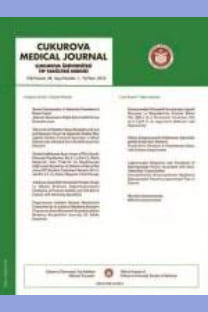Karitane Ebeveyn Kendine Güven Ölçeği: Türkçe geçerlik ve güvenirlik çalışması
Karitane Parenting Self Confidence Scale: Turkish validity and reliability study
parenting, confidence validity, reliability,
___
- Pontoppidan M, Andrade SB, Kristensen IH, Mortensen EL. Maternal confidence after birth in at-risk and not-at-risk mothers: internal and external validity of the Danish version of the Karitane Parenting Confidence Scale (KPCS). J Patient Rep Outcomes. 2019;3(1):1-9.
- Bandura A. Perceived self-efficacy in cognitive development and functioning. Educ Psychol. 1993;28:117-48.
- Usui Y, Haruna M, Shimpuku Y. Validity and reliability of the Karitane Parenting Confidence Scale among Japanese mothers. Nurs Health Sci. 2020;22(2):205-11.
- Shrestha S, Adachi K, Shrestha S. Translation and validation of the Karitane Parenting Confidence Scale in Nepali language. Midwifery. 2016;36:86-91.
- Vance AJ, Brandon DH. Delineating among parenting confidence, parenting self-efficacy, and competence. Adv Nurs Sci. 2017;40(4):18-37.
- Crossland N, Thomson G, Moran VH. Impact of parenting resources on breastfeeding, parenting confidence and relationships. Midwifery. 2020;81:102591.
- Crncec R, Barnett B, Matthey S. Review of scales of parenting confidence. J Nurs Meas. 2010;18(3):210-40.
- Cox JE, Harris SK, Conroy K, Engelhart T, Vyavaharkar A, Federico A, Woods ER. A parenting and life skills intervention for teen mothers: A randomized controlled trial. Pediatrics. 2019;143(3):e20182303.
- Gilkerson L, Burkhardt T, Katch LE, Hans SL. Increasing parenting self-efficacy: The Fussy Baby Network® intervention. Infant Ment Health J. 2020;41(2):232-45.
- Črncec R, Barnett B, Matthey, S. Development of an instrument to assess perceived self-efficacy in the parents of infants. Res Nurs Health. 2008;31:442-53.
- Pereira LW, Bernardi JR, Matos S, Silva CHD, Goldani MZ, Bosa VL. Cross-cultural adaptation and validation of the Karitane Parenting Confidence Scale of maternal confidence assessment for use in Brazil. J Pediatr. 2018;94:192-9.
- Wittkowski A, Garrett C, Calam R, Weisberg D. Self-report measures of parental self-efficacy: A systematic review of the current literature. J Child Fam Stud. 2017;26:2960-78.
- Esin MN. Veri toplama araçlarının güvenilirliği ve geçerliliği. İçinde Hemşirelikte Araştırma (S Erdoğan, N Nahcivan, MN Esin, editörler). 1. Baskı. İstanbul, Nobel Tıp Kitabevi, 2014;193-233.
- Özmen SK, Özmen A. Anne Baba Stres Ölçeği’nin geliştirilmesi. Milli Eğitim Dergisi. 2012;42(196):20-35.
- Davis LL. Instrument review: Getting the most from a panel of experts. Appl Nurs Res. 1992;5(4):194-7.
- Tavakol M, Dennick R. Making sense of Cronbach ’s alpha. Int J Med Educ. 2011;2:53-5.
- Büyüköztürk O, Cakmak EK, Akgün ÖK, Karadeniz Ş, Demirel F. Veri toplama. İçinde Bilimsel Araştırma Yöntemleri. 11. Baskı. Ankara, Pegem Akademi, 2012;101-72.
- Raubenheimer J. An item selection procedure to maximise scale reliability and validity. SA J Ind Psychol. 2004;30(4):59-64.
- Costello AB, Osborne JW. Best practices in exploratory factor analysis: Four recommendations for getting the most from your analysis. Pract Assess Res Evaluation. 2005;10:173-81.
- Taylor R. Depression and gynaecological disorders. In Textbook of Gynaecolog (Eds MM Robertson, CLE Katona=:133-44. New York, John Wiley&Sons, 1997.
- Kline, R. B. Exploratory and confirmatory factor analysis. In Applied Quantitative Analysis in the Social Sciences (Eds Y Petscher, C Schatschneider), 171-207. New York, Routledge. 2013.
- World Health Organization. Process of Translation and adaptation of instruments. http://www.who.int/substance_abuse/research_tools/ translation/en/ (accessed March 2021)
- Polit FD, Beck CT. Nursing research principles and method (6th ed.). Philadelphia,. Lippincott Williams & Wilkins. 2012.
- Lawshe CH. A quantitative approach to content validity. Pers Psychol. 1975;28(4):563-75.
- Strickland OL. Using factor analysis for validity assessment: practical considerations. J Nurs Meas. 2003;11(3):203-5. Akgul A. Statistical analysis techniques in medical researches: SPSS applications (3rd ed.). Ankara, Emek Ofset Ltd Sti, 2005.
- Kline CR. U.S. Patent No. 5,376,094. Washington, DC: U.S. Patent and Trademark Office. 1994.
- Brown TA. Confirmatory factor analysis for applied research. New York, Guilford Publications, 2015.
- Khajehei M, Lee A. Prevalence and risk factors of low parenting confidence in mothers of infants 0–12 months of age: a retrospective file review. J Child Fam Stud. 2019;25(4):397-410.
- ISSN: 2602-3032
- Yayın Aralığı: Yılda 4 Sayı
- Başlangıç: 1976
- Yayıncı: Çukurova Üniversitesi Tıp Fakültesi
Serolojik testlerin tekrarının bruselloz tanısına etkisi: bir pediatrik olgu
Şeyma IŞIK BEDİR, Muharrem ÇİÇEK, Deniz AYGÜN
COVID 19’da sezaryende anestezi yönetimi
Mediha TÜRKTAN, Numan BERK, Mete SUCU
Çiğdem AKCABAY, İbrahim ÜRÜNSAK, Ümran KÜÇÜKGÖZ GÜLEÇ, Esra CİHAN, Mete SUCU, Yılmaz ATAY
Multiple skleroz ile periodontal sağlık arasındaki ilişki: klinik- immunolojik çalışma
Bahar ALKAYA, Mustafa ÖZCAN, Mehmet Cenk HAYTAÇ, Meltem DEMİRKIRAN, Mehmet BALAL
Sıçanlarda letrozolün indüklediği polikistik over sendromunda fisetinin etkileri
Beradiye ÇELİKÇİ, Rüstem Anıl UĞAN, Erdem TOKTAY
Nihal İNANDIKLIOGLU, Osman DEMİRHAN, İbrahim BAYRAM, Atila TANYEL, İ
Covid-19 enfeksiyonunda objektif nutrisyonel indekslerin hastane içi mortaliteye etkisi
Arafat YILDIRIM, Ozge OZCAN ABACIOGLU, Mehmet Cenk BELİBAĞLI
